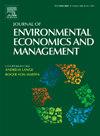推动适应气候变化。有机食品市场信息策略的实地试验
IF 5.9
3区 经济学
Q1 BUSINESS
Journal of Environmental Economics and Management
Pub Date : 2025-07-28
DOI:10.1016/j.jeem.2025.103217
引用次数: 0
摘要
我们进行了一项实地实验,以测试信息信息是否可以推动有机消费者购买支持气候变化适应的“绿色”产品。利用意大利一家大型有机产品在线商店的数据,我们以意大利面为案例研究,研究消费者对一种与现代小麦相比具有更强耐旱性的古老硬粒小麦品种的信息的反应。我们测试了两种类型的信息,它们将气候适应定义为通过日常选择可以实现的:一种是采用相关语气的口语化信息,另一种是采用视觉元素呈现证据的基于科学的信息。我们发现,口语化的信息使“绿色”面食的市场份额增加了13% %,而以科学为基础的信息仅在高度环保意识的消费者中有效。这种影响至少会持续三个月,而且在女性、年轻人和受过高等教育的人群中更为明显。口语化信息的影响在以前经历过严重或极端干旱的消费者中被放大了。我们在最环保的消费者中观察到一种适得其反的效果,即那些已经主要购买古代意大利面的人。本文章由计算机程序翻译,如有差异,请以英文原文为准。
Nudging toward climate adaptation. A field experiment on informational strategies in organic food markets
We conduct a field experiment to test whether informational messages can nudge organic consumers toward purchasing “greener” products that support climate change adaptation. Leveraging data from a large Italian online shop of organic products, we use pasta as a case study to examine consumer responses to information about an ancient durum wheat variety with superior drought tolerance compared to modern wheat. We test two types of messages that frame climate adaptation as achievable through everyday choices: a colloquial information that adopts a relatable tone and a science-based message that presents evidence with visual elements. We find that the colloquial message increases the market share of “greener” pasta by 13 %, while the science-based message is effective only among highly environmentally conscious consumers. Effects persist for at least three months and are stronger among women, younger individuals, and those with higher education. The effect of colloquial messaging is amplified among consumers previously experiencing severe or extreme drought conditions. We observe a backfire effect among the greenest consumers, i.e., those who were already predominantly purchasing ancient pasta.
求助全文
通过发布文献求助,成功后即可免费获取论文全文。
去求助
来源期刊
CiteScore
8.00
自引率
4.30%
发文量
91
期刊介绍:
The Journal of Environmental Economics and Management publishes theoretical and empirical papers devoted to specific natural resources and environmental issues. For consideration, papers should (1) contain a substantial element embodying the linkage between economic systems and environmental and natural resources systems or (2) be of substantial importance in understanding the management and/or social control of the economy in its relations with the natural environment. Although the general orientation of the journal is toward economics, interdisciplinary papers by researchers in other fields of interest to resource and environmental economists will be welcomed.

 求助内容:
求助内容: 应助结果提醒方式:
应助结果提醒方式:


